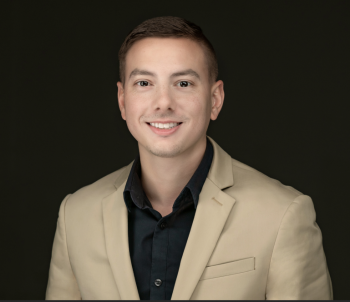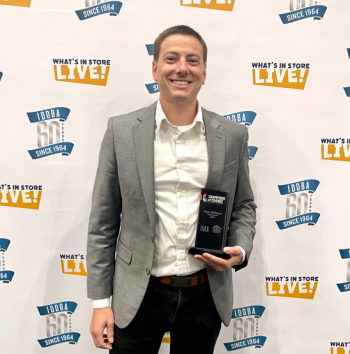
When Tyler Williams, (MS, Food Safety, ‘21), meets with clients, he often finds himself in good company. Most of the time, he is wearing one of his many MSU polos and is able to make an immediate connection with someone familiar with the Master of Science in Food Safety (MSFS) program—or, better yet, a fellow alum. As Williams puts it, “It’s instant recognition. You can feel connected right away, even if you’ve never met before. That’s something I just don’t think I could get at any other program or university.”
Williams, who was recently named to Forbes’ 2024 30 Under 30 list of business leaders, sat down with a few staff members of the College of Veterinary Medicine to discuss the influence his graduate degree has had on his career. He also shared insights into his entrepreneurial journey to becoming CEO of ASI, a farm-to-fork food safety company that has a global presence since its merger with Kiwa, a testing and certification company based in the Netherlands.
Williams began his journey as an undergraduate at Missouri State University, where he focused on the business side of the sciences, majoring in entertainment management. While he initially planned to pursue a career in sports management after graduation, his path took an unexpected turn when his mother, Charray, decided to acquire ASI (then known as ASI Food Safety Consultants), where she had worked for many years.
As things rapidly progressed with her venture, Williams decided to pivot and join what’s now the family business. He joined ASI and seamlessly fit into the fold, applying all that he’d learned from his business background into his new career. “Once I was at ASI and started learning more about food science and food safety, I was hooked,” shares Williams. “I knew that if this was something I was serious about and want to pursue, I should get my masters, and that’s exactly what I did.” Williams enrolled in MSU’s MSFS program and began learning while working full time, gaining knowledge and experience all while continuing his upward path within the company’s leadership.
During his time in the program, Williams gained valuable insights into international food regulations, particularly Chinese and EU laws. These insights have been crucial as he navigates his company's recent expansion into global markets and engaging with overseas colleagues and clients involved in exporting to these regions. Another standout takeaway from the program for Williams was the focus on research and verification, skills that have been essential to his work.
For his final project, titled, “Current Good Manufacturing Practices and Cannabis Safety & Quality: A Comparison of Third-Party Audits in the Edible Cannabis Industry," Williams was presented with the unique opportunity to simultaneously execute his last assignment while working to launch CSQ (Cannabis Safety and Quality), the first accredited cannabis certification program. Focusing on cannabis-infused edibles, Williams visited ten facilities across the country, reviewing their processes and evaluating how they would measure up against a hypothetical audit geared towards these products.
With the support of his work and findings, Williams had the tools to transform his ideas into reality. Williams reflects, "I was able to complete my project, learn about something I was passionate about, and turn it into a thriving business that is now part of ASI and Kiwa.” Today, CSQ has over 100 certified facilities, and 9 of the top 10 largest cannabis brands certified to their program at one facility.

Williams’s impact in the cannabis industry and his continued commitment to prioritizing consumer safety, all while leading a growing company, is a testament to why he has been recognized by Forbes. The accolade reflects Williams’s talent for forward-thinking and problem-solving, qualities that drive his mission. His work empowers consumers to make informed choices every day based on preferences, not fears.
As for Williams’s future, the possibilities are boundless. He plans to expand into new markets, including cosmetics, medical devices, and over-the-counter drugs. He’s also exploring offering certifications beyond safety, such as verification of label claims.
To close, we asked Williams for advice for those considering a master’s in food safety. His response? Simple: “Do it!”
For more information on the MSFS program, please visit foodsafety.msu.edu.
